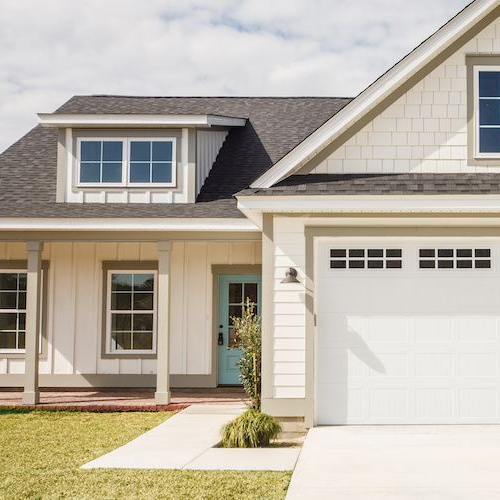What Is Fannie Mae (FNMA)? A guide for home buyers
Apr 10, 2024
•8-minute read

Effective November 16, 2025, both Fannie Mae and Freddie Mac are removing the minimum credit score requirement from their conventional loan eligibility guidelines. Loan approval will instead be based on an evaluation of overall credit risk factors.
Whether you’re in the market to buy a home, refinance a house or just follow the news, you’ve probably heard of Fannie Mae, otherwise known as the Federal National Mortgage Association (FNMA). You may even be aware that Fannie Mae plays a significant role in the housing market, even if you’re not fully familiar with how it works.
When choosing a mortgage, Fannie Mae is just one provider that may be available to you. Still, understanding how investors like Fannie Mae work will give you a better understanding of the housing market and the overall process associated with getting a mortgage.
What is Fannie Mae?
Fannie Mae is a government-sponsored enterprise (GSE) that purchases mortgage loans from commercial banks and other lenders and guarantees, or backs, these loans on the mortgage market. The mortgages are sold as mortgage-backed securities to investors, providing the necessary liquidity in the mortgage markets to make more loans and keep housing affordable.
What does Fannie Mae do?
According to its website, Fannie Mae’s mission is to “facilitate equitable and sustainable access to homeownership and quality, affordable rental housing across America.” There are three key ways in which Fannie Mae works to achieve its goals, which include:
- Enabling liquidity in the mortgage market to keep mortgages more affordable
- Providing programs, products and tools to make homeownership more attainable and affordable
- Educating homeowners and renters on several aspects of the housing market, including foreclosure prevention
History of Fannie Mae
The Federal National Mortgage Association was founded in 1938 by Congress as a GSE to provide affordable housing. Prior to that, getting a mortgage required a down payment that could be 50% or more. There were also very strict terms which often enabled the lender to take your home back if you had even one missed payment.
Since its founding, Fannie Mae has seen growth as well as its fair share of bumps. In 1968, Fannie Mae became a private entity after Congress allowed shareholders to invest funds from the stock and bond markets. However, in the late 2000s, Fannie Mae was hit hard by the economic downturn and subsequent troubles in the real estate market.
Fannie Mae has been under the government conservatorship of the Federal Housing Finance Agency (FHFA) since late 2008. It was delisted from the New York and Chicago stock exchanges in mid-2010. Under the agreement, the FHFA financially supports Fannie Mae in certain circumstances in exchange for preferred stock.
How do Fannie Mae (FNMA) loans work?
Because Fannie Mae doesn’t originate loans, you can’t get your mortgage directly from this GSE. Banks and non-bank lenders like Rocket Mortgage® are responsible for collecting a client’s application, underwriting the loan – by verifying income, assets and property value – and getting them to the closing table. Once the loan closes, Fannie Mae buys loans that meet its requirements from lenders.
Fannie Mae conforming loan limits
The FHFA sets requirements for Fannie Mae, called conforming loan limits. These mortgage loans, known as conforming mortgages, are guaranteed by Fannie Mae. This means they’ll make investors whole if the borrower goes into default. Fannie Mae packages these loans into mortgage-backed securities (MBS) before selling them on the open bond market to investors.
An MBS might consist of 1,000 loans or more that have similar characteristics. Fannie Mae has certain rules, among them that they won’t buy non-conforming loans.
Many components can make a loan nonconforming, but one of the most common characteristics is jumbo loan status. A jumbo loan is any loan above $832,750 for single-unit properties in non-high-cost areas, such as locations outside of Alaska, Guam, Hawaii, and the U.S. Virgin Islands.
Fannie Mae loan requirements
You should always feel free to speak with a Home Loan Expert about your situation, but the following is a short list of general guidelines for Fannie Mae loan approval:
Credit score
Your credit score plays a role in the loan approval process. With loans from either Fannie Mae or its competitor, Freddie Mac, you’ll need a qualifying FICO® Score of at least 620. If you're an individual borrower, your qualifying score is the median between the three major credit bureaus – Experian®, EquifaxTM and TransUnion®.
Something that's unique to Fannie Mae loans is that if there are two or more borrowers on the loan, the average of the median credit scores becomes your qualifying credit score to get a mortgage.
Debt-to-income ratio (DTI)
Your debt-to-income ratio (DTI), which compares your monthly debt payments to your before-tax monthly income, should be no higher than 50% in most cases to qualify for a Fannie Mae loan. This may need to be lower depending on your situation.
Down payment
The down payment requirements are higher for second homes and investment properties, but for a single-unit primary residence, the down payment needed for a Fannie Mae loan could be anywhere from 3% to 5%.
Reserves
Reserves represent the number of mortgage payments lenders want to see in your account in case you experience a loss of income or other financial hardship. Your reserves could be up to 6 months with a Fannie Mae loan, although 2 months is generally a good starting point.
Reserves are not generally required for a primary residence – only second homes and investment properties unless there are other risks in the profile.
Fannie Mae mortgage programs
Fannie Mae is a mortgage investor, but they have programs intended to help everyone from home buyers to current homeowners and even renters.
HomeReady®
Available for both first-time and repeat home buyers, the HomeReady® program allows you to buy a home, refinance to lower your rate and/or change your loan term with as little as 3% down or in existing equity.
Because it’s intended to help clients with low-to-moderate incomes, those on the loan can’t make more than 80% of the area median income between them. Fannie Mae does have an option to have 3% down without income limits, but at least one client must be a first-time home buyer.
The HomeReady® program has a $2,500 credit that goes toward closing costs if you make half the area median income or less where you're looking to buy.
HomePath®
HomePath® is the site where Fannie Mae features foreclosures that it’s taken possession of to resell, also known as real estate owned (or REO) properties. You have to know what you’re getting into when buying a foreclosed property because they’re typically sold as is, and they often require some work. However, you may be able to get a good deal.
97% LTV program
The 97% LTV program allows home buyers to put as little as 3% down on a home, resulting in a loan-to-value ratio of 97%. These loan options are available to first-time home buyers and those refinancing a Fannie Mae loan. Requirements for income limits and home buyer education must be met in order to qualify.
RefiNow™
The RefiNow™ program offers options for homeowners who have experienced difficulty qualifying for a refinance to lower their mortgage payments in the past. RefiNow™ has looser requirements around DTI and home equity, which serves homeowners who meet certain low-income thresholds.
Eligible homeowners for the RefiNow™ program need to see at least a 0.5% reduction in their interest rate, and their overall mortgage payment has to decrease. There are other benefits of the RefiNow™ program, including that those who qualify will receive a $500 credit toward a home appraisal if the appraisal is mandatory.
It's important to note that when qualifying for RefiNow™, the lowest median credit score is used for qualifying even when there are multiple clients on the loan. The lowest median FICO® Score among all borrowers on the loan can't be lower than 580.
HFA Preferred™
HFA Preferred™ is an affordable lending product that Fannie Mae issues in conjunction with Housing Finance Agencies (HFAs). These loans feature flexible underwriting requirements such as LTV ratios of up to 97%, borrower income limits set by the HFA and reduced mortgage insurance coverage for those at or below 80% area median income.
Mortgage Help Network
If for any reason you’re struggling with your monthly mortgage payment, homeowners with Fannie Mae-owned loans can utilize the Mortgage Help Network.
This program allows homeowners to work with a Department of Housing and Urban Development (HUD) housing counselor. HUD counselors will step in to go over the situation, look at options and serve as a liaison between homeowners and a mortgage servicer.
If you’re a Rocket Mortgage client who’s having or may soon be having payment trouble, please feel free to reach out to us by filling out our Application for Success. We’re here to help!
Tenant-In-Place rental program
If you’re a tenant in a Fannie Mae-owned property that’s currently being foreclosed upon, you may be able to continue renting at current market rates with the Tenant-In-Place program.
In certain cases, you may be able to keep your current lease. In others, you may be given the option to sign a new lease agreement. Fannie Mae's offers include month-to-month leases as well as those that are good for a specific term.
FAQs about Fannie Mae
Want to dive in deeper and learn more about Fannie Mae and their loans? Check out the answers to some frequently asked questions below.
What is a Fannie Mae loan?
Fannie Mae offers several loan products that have more lenient requirements than other mortgages, making it easier for individuals to qualify. These loans, which include HomeReady and RefiNow™, are available through private lenders.
What is the down payment for a Fannie Mae loan?
For a single-unit primary residence, the down payment can be as low as 3% with the HomeReady loan, though other types of Fannie Mae programs may require 5% down. When it comes to second homes, the down payment across all eligible Fannie Mae programs must be at least 10%, while an investment property will require at least 15% down.
Are Fannie Mae loans assumable?
Fannie Mae loans have a due-on-sale provision that requires the original loan to be paid when ownership of the home transfers from one individual to another. However, in some instances, Fannie Mae loans can be eligible for an assumption. Fannie Mae, along with the mortgage services and insurer, will determine if the loan is eligible for assumption and whether there are any conditions that must be met.
Is Fannie Mae a conventional loan?
Most mortgages backed by Fannie Mae are conventional loans, meaning they’re not insured by the government. In order to be purchased by Fannie Mae, conventional loans must also be conforming, meaning they conform to the guidelines Fannie Mae puts in place.
The bottom line: There are many Fannie Mae loan options available
Fannie Mae is a government-sponsored enterprise that offers mortgage options that support the real estate market and current home buyers and homeowners looking to refinance. Ready to find the right loan for you? Start your application for an initial mortgage approval today.
You can also feel free to reach out to one of our Home Loan Experts at (833) 326-6018.
Client will receive a 1 point (1.000) loan level price adjustment (LLPA) credit on HomeReady purchase loans locked on or after January 2, 2024. One point (1.000) is equal to 1% of the loan amount. Minimum credit amount will be $2,000. Maximum loan amount is $350,000. Clients with Home Possible loans will receive a lender credit of $2,500 when their income is below 50% of the median in their area. Offer is not available with any other discounts or promotions. Offer cannot be retroactively applied to previously closed loans or loans already in process; offer is not transferable. Rocket Mortgage reserves the right to cancel/modify this offer at any time. Additional restrictions/conditions may apply. This is not a commitment to lend.

Victoria Araj
Victoria is a former Team Leader of editorial content at Rocket Mortgage and she held roles in mortgage banking, public relations and more in her 19+ years with the company. She holds a bachelor’s degree in journalism with an emphasis in political science from Michigan State University, and a master’s degree in public administration from the University of Michigan.
Related resources

13-minute read
What is affordable housing? How to find and qualify for it
Affordable housing is defined as an occupant paying no more than 30% of their income to housing. Here’s how it works and how to qualify for affordable ...
Read more

10-minute read
14 questions to ask a mortgage lender
The best way to pinpoint the right mortgage lender for you is to ask plenty of questions. Read through these 14 essential ones to get you started.
Read more

10-minute read
Checklist for buying your first house
The process of buying a home can be complicated, especially for first-time buyers. Make it simpler with this house buying checklist.
Read more